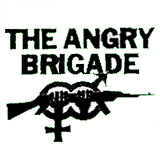Loading AI tools
British urban guerilla group (1970–1972) From Wikipedia, the free encyclopedia
The Angry Brigade was a far-left British terrorist group responsible for a series of bomb attacks in England between 1970 and 1972. Using small bombs, they targeted banks, embassies, a BBC Outside Broadcast vehicle, and the homes of Conservative Members of Parliament (MPs). In total, police attributed 25 bombings to the Angry Brigade. The bombings mostly caused property damage; one person was slightly injured. Of the eight people who stood trial, known as the Stoke Newington Eight, four were acquitted. John Barker, along with Hilary Creek, Anna Mendelssohn and Jim Greenfield, were convicted on majority verdicts, and sentenced to ten years. In a 2014 interview, Barker described the trial as political, but acknowledged that "they framed a guilty man".[1]
| The Angry Brigade | |
|---|---|
| Angry Brigade Resistance Movement | |
 Logo associated with the Angry Brigade, used on the cover of The Angry Brigade by Gordon Carr | |
| Dates of operation | 1968–1970, 1980s |
| Active regions | |
| Ideology | Anarcho-communism Anti-imperialism Anti-monarchism |
| Political position | Far-left |
| Status | Defunct |
| Opponents | United Kingdom United States |
In mid-1968 demonstrations took place in London, centred on the US embassy in Grosvenor Square, against US involvement in the Vietnam War. One of the organisers of these demonstrations, Tariq Ali, has said he recalls an approach by someone representing the Angry Brigade who wished to bomb the embassy; he told them it was a terrible idea and no bombing took place.[2]
The Angry Brigade decided to launch a bombing campaign with small bombs, in order to maximise media exposure to their demands while keeping collateral damage to a minimum. The campaign started in August 1970 and continued for a year until arrests took place the following summer.[3]
Targets included banks, embassies, a BBC Outside Broadcast vehicle earmarked for use in the coverage of the 1970 Miss World event, and the homes of Conservative Members of Parliament (MPs). In total, police attributed 25 bombings to the Angry Brigade. The bombings mostly caused property damage; one person was slightly injured.[3]
In the 1980s the Angry Brigade resurfaced as the Angry Brigade Resistance Movement, part of the Irish Republican Socialist Movement (IRSM).[4][5]
Jake Prescott, whose origins were in the mining community of Dunfermline, was arrested and tried in 1971. Melford Stevenson[6] sentenced him to 15 years imprisonment (later reduced to 10), mostly spent in Category A high security prisons. Later he said he realised then that he "was the one who was angry and the people [he] met were more like the Slightly Cross Brigade".[7] The other members of the group from North-East London, the "Stoke Newington Eight", were prosecuted for carrying out bombings as the Angry Brigade in one of the longest criminal trials of English history (it lasted from 30 May to 6 December 1972). As a result of the trial, John Barker, Jim Greenfield, Hilary Creek and Anna Mendelssohn received prison sentences of 10 years. A number of other defendants were found not guilty, including Stuart Christie, who had previously been imprisoned in Spain for carrying explosives with the intent to assassinate the Spanish dictator General Franco, and Angela Mason who became a director of the LGBT rights group Stonewall and was awarded an OBE for services to homosexual rights.[8]
In February 2002, Prescott apologised for his role in bombing Robert Carr's house and called on other members of the Angry Brigade to also come forward.[9]
On 3 February 2002, The Guardian reported a history of the Angry Brigade and an update on what its former members were doing then.[10] On 9 August 2002, BBC Radio 4 aired Graham White's historical drama, The Trial of the Angry Brigade. Produced by Peter Kavanagh, this was a reconstruction of the trial combined with other background information. The cast included Kenneth Cranham, Juliet Stevenson, Tom Hiddleston and Mark Strong.[11]
In 2009, family care activist and novelist Erin Pizzey won a libel case against Macmillan Publishers after Andrew Marr's History of Modern Britain had falsely linked her to the Angry Brigade.[12][13] The publisher also recalled and destroyed the offending version of the book, and republished it with the error removed.[14] The link to the Angry Brigade was made in 2001, in an interview with The Guardian, in which the article states that she was "thrown out" of the feminist movement after threatening to inform police about a planned bombing by the Angry Brigade of the clothes shop Biba. "I said that if you go on with this – they were discussing bombing Biba [the legendary department store in Kensington] – I'm going to call the police in, because I really don't believe in this".[15]
The group and trial feature in Jake Arnott's 2006 novel Johnny Come Home.[16] Hari Kunzru's 2007 novel My Revolutions is inspired by the Angry Brigade.[17] The Angry Brigade is a 2014 play by James Graham.
4 May – Attempted assassination of Marcia Anastasia Christoforides Dunn Beaverbrook. A bomb was attached to the bottom of her car, however the bomb was discovered before it exploded, and the bomb was disarmed.
12 January – Attempted assassination of Robert Carr. Two bombs exploded at the home of British Employment Secretary Robert Carr, his house was severely damaged, no-one was killed or injured.[18]
Seamless Wikipedia browsing. On steroids.
Every time you click a link to Wikipedia, Wiktionary or Wikiquote in your browser's search results, it will show the modern Wikiwand interface.
Wikiwand extension is a five stars, simple, with minimum permission required to keep your browsing private, safe and transparent.